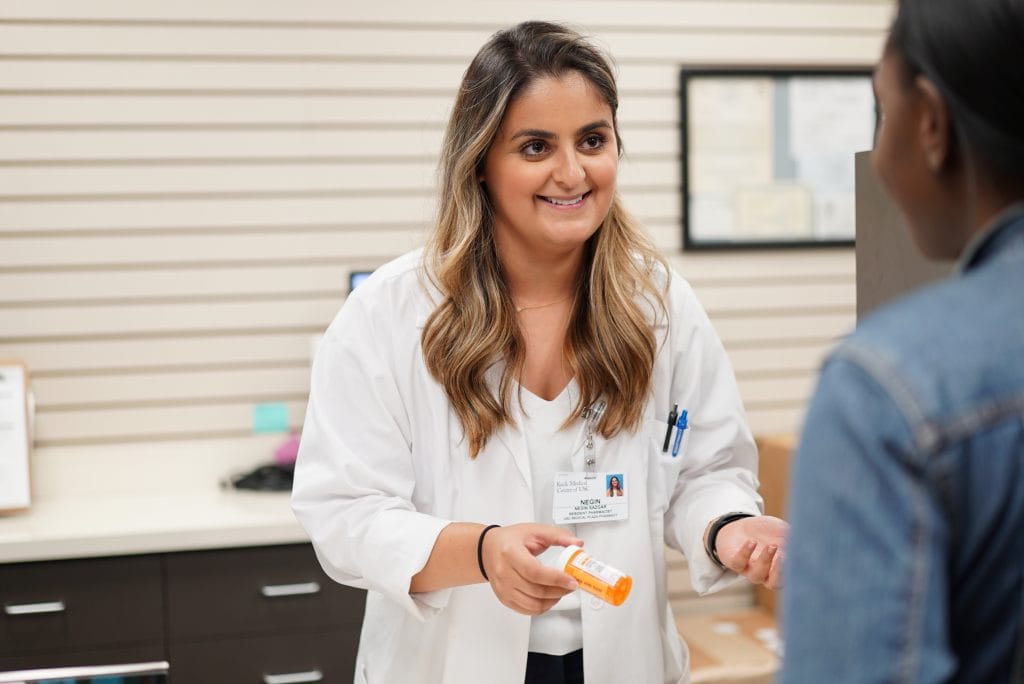With nearly nine in 10 Americans living within five miles of a community pharmacy, community pharmacists are some of the most accessible healthcare professionals. In a rapidly changing healthcare landscape, this accessibility, coupled with an expanding scope of practice — preventing disease, improving quality of care and increasing access to care — give community pharmacists the opportunity to tackle critical public health issues as integral healthcare team members. The USC School of Pharmacy Community-Based Pharmacy Residency Program (CPRP), a multisite program with primary practice site locations across Los Angeles and Orange County, trains residents to be pharmacists on the front line of this shift.
“In this rapidly advancing practice setting, there needs to be an emphasis on how to develop new patient services in an outpatient community pharmacy,” said Richard Dang, director of the CPRP and assistant professor of clinical pharmacy at the USC School of Pharmacy. “Our program does just that.”
Nationwide, community-based pharmacy practice has had a decades-long evolution from a primary focus on medicinal products to an emphasis on clinical information and practice models that deliver patient-centered medicine. Accredited since 1999, the CPRP at the USC School of Pharmacy has played a crucial role in promoting the tenants of community-based pharmacy: direct patient care, team-based care delivery, patient care services management and leadership in advancing patient care.
New geriatric care practice site
With an eye toward the future of pharmacy, the CPRP has added the USC and UC Irvine Senior Health Center program as its newest primary practice site location. Residents will be splitting their time between the USC Verdugo Hills Professional Pharmacy in Glendale and the UC Irvine Senior Health Center at the UC Irvine Medical Center.
At the UC Irvine Senior Health Center, residents will work as part of a mulitdisciplinary team to provide care for older patients. They will work alongside physicians, physician assistants, nurse practitioners, geropsychologists, geriatric social workers, geriatric pharmacists, dieticians and occupational therapists.
“Geriatric care is a team sport,” said Tatyana Gurvich, primary preceptor at the UC Irvine Senior Health Center and assistant professor of clinical pharmacy at the USC School of Pharmacy. “The community pharmacy resident will be embedded in a multidisciplinary geriatrics practice and gain a deeper understanding of how to partner with physicians to provide more comprehensive patient care.”
“As our population ages, we’re going to need more trained pharmacists to help serve and care for seniors,” Dang added.
Other primary practice site locations include: USC Pharmacies and affiliated clinics, Ralphs Pharmacy (a Kroger Company), CliniCare Pharmacy (an independent pharmacy) and Keck Medicine of USC Specialty Pharmacy.
Opening doors
Past community-based pharmacy residents have gone on to succeed in a wide range of positions in academia, ambulatory care, community pharmacy management, pharmacy administration and community pharmacy ownership. 98 percent of residents are employed within three months.
“My residency provided me training in all facets of pharmacy,” said alumnus and CEO of 986 Pharmacy, Ken Thai, PharmD ’02. “Ultimately, I decided to become an independent pharmacy owner, and my residency empowered me to pursue my interests in entrepreneurship.”
Alumna Krysty Avila, PharmD ’17, St. John’s Well Child and Family Center’s first clinical pharmacist providing primary and HIV specialty care, echoed this sentiment, adding that the program gave her both the support and opportunity to grow as a professional and as a clinician.
“My residency experience gave me the confidence and skills to build a dynamic practice serving the needs of underserved populations in South Los Angeles,” Avila said.
Learn more about the residency programs at the USC School of Pharmacy here.


